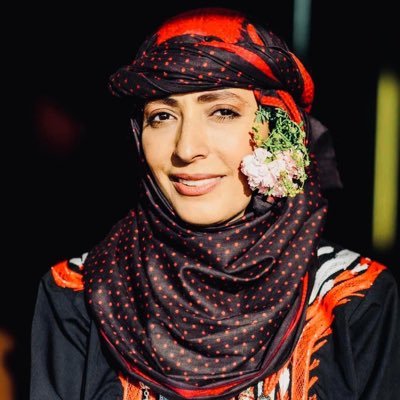Ms. Tawakol Karman is a Yemeni human rights activist, journalist, and Nobel Peace Prize Laureate in 2011. She was known in the arenas of the Yemeni revolution and the Arab Spring. She was also known for opposing human rights violations, and financial and administrative corruption in Yemen, and for her persistent demand for political reforms. She was one of the first to demand the overthrow of the regime of ousted President Ali Abdullah Saleh.
Tawakol Abdel Salam Karman was born on February 7, 1979, in Taiz Governorate, to a rural family from the Makhlaf Shara’b area.
She is the daughter of politician and lawyer Abdel Salam Khaled Karman and the mother of three children.
Her family moved to the capital, Sanaa, due to her father’s work, where she studied there.
She obtained a bachelor’s degree in commerce in 1999 from the University of Science and Technology in Sana’a, a master’s in political science, a diploma in education from Sana’a University, and a diploma in investigative journalism from the United States.
Ms. Karman is a prominent leader in the popular youth revolution, and an active member of many unions and human rights and press organizations inside and outside Yemen.
She is a member of the Shura Council of the Yemeni Congregation for Reform party and a member of the Yemeni Revolution Coalition.
Ms. Karman is the chairwoman of “Women Female Journalists Without Chains”, and one of the most prominent defenders of press freedom, women’s rights, and human rights in Yemen.
Ms. Karman was at the forefront of the protestors who demanded the overthrow of President Ali Abdullah Saleh’s regime and led many sit-ins and peaceful demonstrations in “Freedom Square” (as named by human rights activists in Yemen, before the beginning of the demonstrations in the Arab world).Freedom Square became a place where many journalists, civil society activists, politicians, and many who have demands and human rights issues gather, every week.
Ms. Tawakol was known for her courage, daring, and firm demand for political reforms in the country, as well as for religious reform and renewal.
She led more than eighty sit-ins in 2009 and 2010, five in 2008, and 26 sit-ins in 2007.
She wrote many articles in Yemeni, Arab, and international newspapers, mainly calling for the overthrow of the Saleh regime during 2006-2007.
She also participated in many conferences outside Yemen on interfaith dialogue, political reforms in the Arab world, freedom of expression, and combating corruption.
Ms. Karman was detained on January 23, 2011, on charges of holding unpermitted gatherings and marches, inciting chaos and riots, and undermining public social peace. She was released a day later, as her arrest sparked a new wave of protests in the capital, Sanaa.
While the ruling party accused her and her colleagues of being agents to the United States of America, the protestors calling for change described her as the second Bilqis.
Through her media work – articles and documentaries – she touched on many phenomena that trouble large segments of Yemenis, such as suicide, women’s political participation, underage marriage, child smuggling, and the violation of human rights.
After the Houthi group and its militias took control of Sanaa on September 21, 2014, Tawakol strongly criticized President Abd Rabbu Mansour Hadi and stressed that his authority does not exceed the walls of the presidential palace.
She also strongly confronted the Houthis who attacked her home, and described what they did in Sanaa (putting the president and the government under house arrest) as a coup against the legitimate authority and the Peace and Partnership Agreement and said it was the “biggest farce” in the history of Yemen.
Ms. Karman supported the military campaign “Decisive Storm” launched in March 2015 by several Arab countries led by Saudi Arabia against the Houthis in favor of legitimacy.
She considered the military operation as a way to prevent the Houthis from imposing their authority on the Yemenis with the support of the ousted President Ali Abdullah Saleh and Iran.
In October 2011, and the culmination of her struggle, the Swedish Academy announced that activist Tawakol Karman, President of Liberia Ellen Johnson Sirleaf, and fellow activist Lema Gbowee, were joint Nobel Peace Prize winners.
In its statement, the Nobel Committee stated that it has declared the three women winners “in recognition of their peaceful struggle for the safety and rights of women, and for their participation in efforts to build and achieve peace.
“Time” magazine readers ranked her 11th on the list of the 100 most influential people in the world in 2011.
Karman was also awarded the US Embassy’s Courage Award,
“Reporters Without Borders” identified her among seven women who made a difference in the world.
She was honored by the Yemeni Ministry of Culture, and local and international civil institutions and organizations.
Ms. Karman is an active member of the boards of directors of many international organizations, and she lectures at many prestigious international universities.


